BP Pleads Guilty
Air Date: Week of November 16, 2012
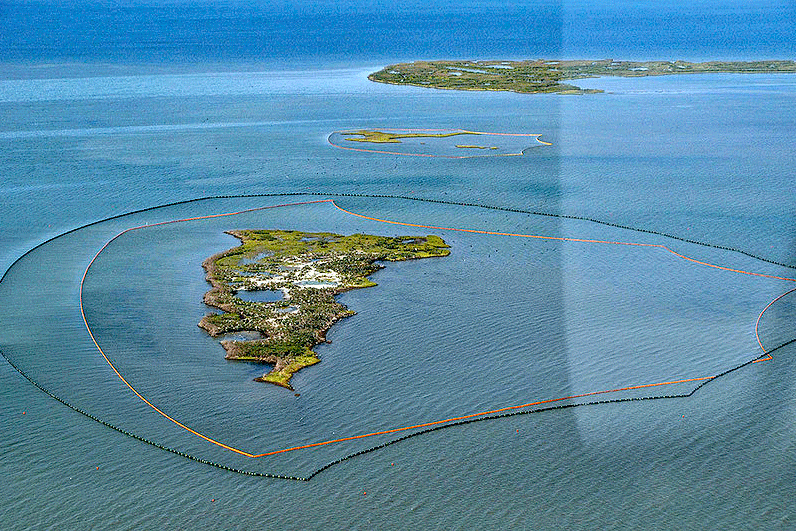
An oil containment boom deployed by U.S. Navy Supervisor of Salvage and Diving personnel surrounds New Harbor Island, La. to mitigate environmental damage from the Deepwater Horizon oil spill. (Photo: http://www.wikipedia.org/).
Oil giant BP will plead guilty to 11 felony counts and pay $4.5 billion to settle criminal charges in the Deepwater Horizon well disaster. Host Steve Curwood discusses the decision with William Reilly, co-chair of the Presidential Commission that investigated the disaster.
Transcript
CURWOOD: It's Living On Earth, I'm Steve Curwood. Oil giant BP will pay a record $4.5 billion fine to settle criminal charges relating to the 2010 oil disaster in the Gulf of Mexico. The company agreed to plead guilty to 11 counts of felony misconduct after the Macondo well explosion that killed 11 workers and spewed nearly five million barrels of oil into the Gulf. BP will also plead guilty to misdemeanors under the Clean Water and Migratory Bird Treaty Acts, and a felony count of obstruction of Congress.
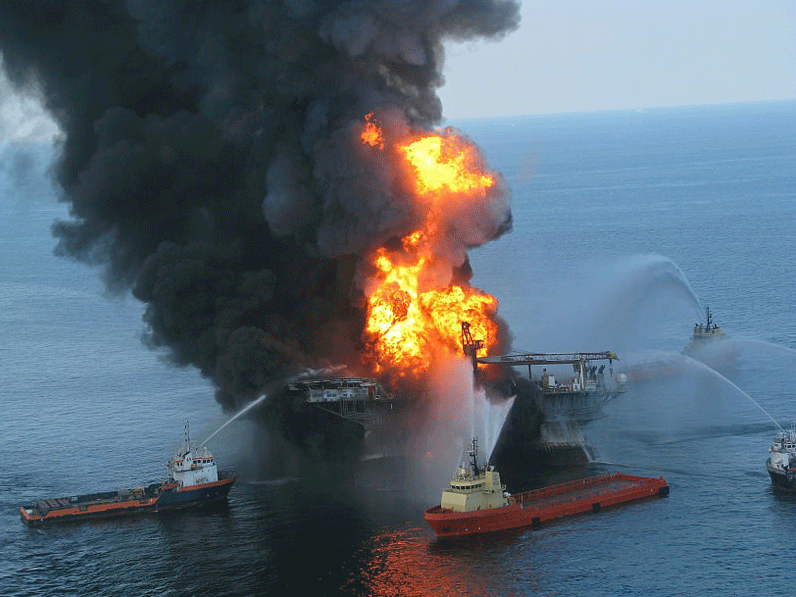
Deepwater Horizon offshore drilling unit on fire (Photo: http://www.wikipedia.org/).
Most of the company’s felony charges relate to misinterpreting pressure readings that showed leaks in the wellhead of the Deepwater Horizon rig. In addition, two senior BP supervisors face trial for manslaughter related the deaths of the 11 workers. Joining us by phone now from Beijing is William Reilly; he co-chaired the National Commission on the BP Deepwater Oil Spill and Off-shore Drilling. Hello!
REILLLY: Good day Steve!
CURWOOD: So, what’s your take on the settlement of criminal charges with BP?
REILLLY: With anything of this sort, the government wants to establish something of a warning, a precedent, send a signal, and generally mete out some punishment. I think all of those objectives were met in the agreement that has just been reached – in the findings that have just been reached.
The negative pressure test, which is the basis for most of the criminal counts, certainly was misinterpreted, and it very clearly appears that was negligently so. One of the two people who was monitoring the negative pressure test did not survive the disaster, and so there are certain things that was not known about it.
But there was an indication; there were two negative pressure tests, and an indication from one of gas rising in the bill pipe. And that was ignored in favor of a second test, which also was conducted a somewhat different way, which indicated no change in pressure. So I think the basis for the conclusions is sound, given what the commission concluded, and I’m not surprised.
CURWOOD: So, this is what you expected?
REILLLY: Yes. I think given the… there are a couple of things in there that surprised me… the obstruction of Congress findings based on misrepresentation of the flow rate. And that surprised me a little bit, because it struck me that there was much confusion about it on the part of the company, and certainly of the government, which led to a lot of concern, and I think some loss of confidence on the part of the public in the government and the company in the early days of the spill.
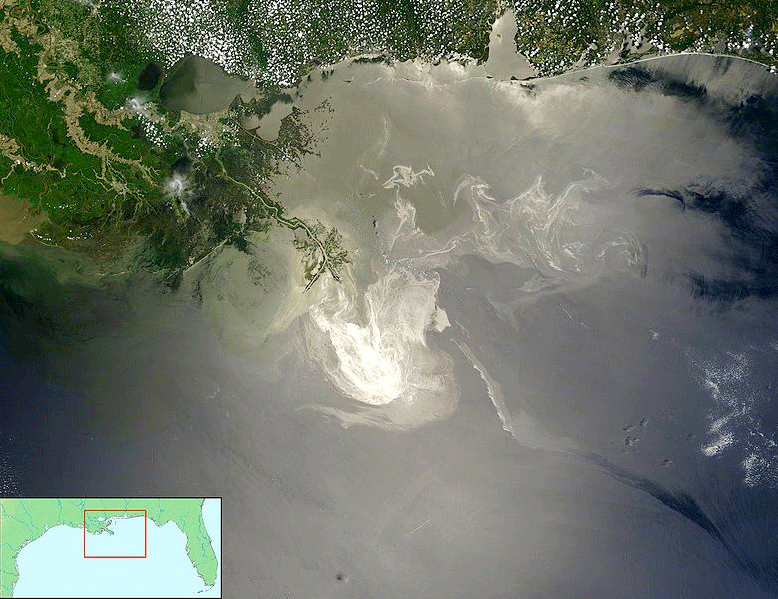
NASA's Terra Satellites Sees Deepwater Horizon oil spill on May 24, 2010. (Photo: http://www.wikipedia.org/).
And it wasn’t entirely clear to me that that was anything more than the failure to have the kind of technology that would allow you to make that determination. But it was certainly a very important mistake, and BP has paid the price for it. I have no question in the future, and we’ve been assured by the head of the USGS Marcia McNutt, that it would not take more than a couple of weeks to determine the flow rate, if there were, lord forbid, another accident of that sort.
CURWOOD: So, it’s a $4 billion dollar settlement, it surpasses the $1.3 billion that was levied against Pfizer for marketing fraud back in 2009… the biggest criminal settlement against a company… the right size?
REILLY: Well, in any accident of this sort, I’m sure the Justice Department is concerned about proportion. And this was a wholly disproportionate accident; we’ve never had anything happen like this before. It did take lives. The Exxon Valdez disaster which involved in $1.1 billion dollar settlements against the company, did not involve loss of life, and certainly it involved much less disruption, and of course occurred in a less populated area.
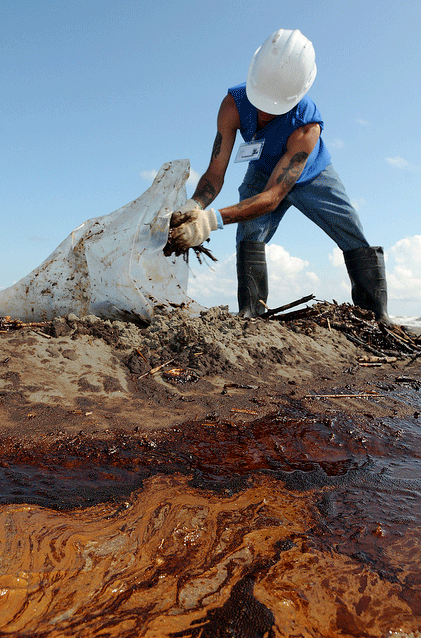
Contractors Assist in Deepwater Horizon Spill (Photo: DVIDSHUB)
So I don’t think this is inconsistent with the very extensive damage that was caused, the disruption of people’s lives. Some 47,000 people were involved in the cleanup and many, many more suffered loss of income, some loss of business. I think this is quite an appropriate reflection of the seriousness of what occurred.
CURWOOD: How much does this reflect care about the environment?
REILLY: The Migratory Bird Species count is a clear signal, as is the allocation of a significant amount of penalties that are being paid over five years to the Fish and Wildlife Foundation. I think it very strongly includes an element of acknowledgement that the environment suffered just as people did.
CURWOOD: We’re getting some feedback from the Gulf Coast region among the locals that BP is getting off lightly – they’re not too happy about that. What would you say to them?
REILLY: This is not the end of the affair. Obviously, civil claims still exist against the company, and one will await the negotiations of those types of settlements. I have heard that those settlements are relatively near, but there is clearly more to come.
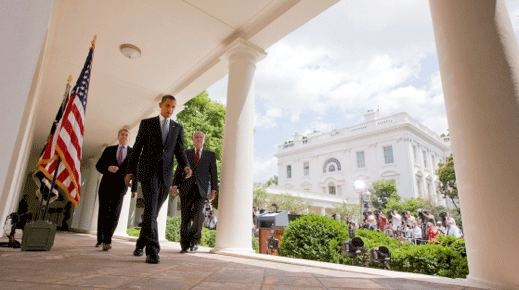
President Barack Obama and BP Oil Spill Commission co-chairs, former EPA Administrator William Reilly, left, and former Sen. Bob Graham of Florida, right, walk back to the Oval Office after speaking to the media in the Rose Garden of the White House, June 1, 2010. (Official White House Photo by Chuck Kennedy) June 1, 2010. (Official White House Photo by Chuck Kennedy)
CURWOOD: Of course, there are other companies involved with this, I’m thinking of TransOcean, I’m thinking of Halliburton - what does this criminal settlement with BP suggest might happen with those companies?
REILLY: Well, I won’t really comment on the likelihood of criminal charges against other companies, but just to say that the Commission did conclude that significant mistakes were made by the other two principal companies ¬– the service companies – and no doubt that they will be involved with something going forward with the government.
CURWOOD: Bill Reilly, what does this criminal settlement with BP tell us about the company’s future for drilling in this country?
REILLY: Well, we were asked quite often, I was asked in Alaska, whether BP should be precluded from continuing from to operate in the north slope in Alaska, and I said, what I believe then and believe even more strongly now, that companies learn from their mistakes. Some of the safest companies have had their disasters and gotten to be models, model citizens for environmental concern and protection.
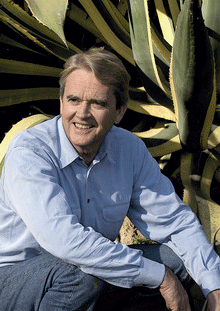
William K. Reilly. (Photo: http://worldwildlife.org/leaders/william-k-reilly).
I think that Exxon Mobil after Exxon Valdez went through a transformation that has left it in the minds of many oil industry figures and others among the safest of companies. So, BP clearly has set about policies that go beyond regulations in many areas, and I think they’ve taken this to heart. And so I think one can expect that BP will do everything that one can expect of BP in the future to comply with the law and to exceed some of the requirements, in fact, under the regulations.
CURWOOD: Well, thank you for taking this time with me today.
REILLY: Very pleased to do it. This closes an important chapter in a very sad history of the accident that occurred in 2010.
CURWOOD: Former EPA Administrator, William Reilly, co-chaired the National Commission on the BP Deepwater Oil Spill and Offshore Drilling.
Links
Final report by the National Commission on the Deepwater Horizon Oil Spill and Offshore Drilling
Living on Earth wants to hear from you!
Living on Earth
62 Calef Highway, Suite 212
Lee, NH 03861
Telephone: 617-287-4121
E-mail: comments@loe.org
Newsletter [Click here]
Donate to Living on Earth!
Living on Earth is an independent media program and relies entirely on contributions from listeners and institutions supporting public service. Please donate now to preserve an independent environmental voice.
NewsletterLiving on Earth offers a weekly delivery of the show's rundown to your mailbox. Sign up for our newsletter today!
 Sailors For The Sea: Be the change you want to sea.
Sailors For The Sea: Be the change you want to sea.
 The Grantham Foundation for the Protection of the Environment: Committed to protecting and improving the health of the global environment.
The Grantham Foundation for the Protection of the Environment: Committed to protecting and improving the health of the global environment.
 Contribute to Living on Earth and receive, as our gift to you, an archival print of one of Mark Seth Lender's extraordinary wildlife photographs. Follow the link to see Mark's current collection of photographs.
Contribute to Living on Earth and receive, as our gift to you, an archival print of one of Mark Seth Lender's extraordinary wildlife photographs. Follow the link to see Mark's current collection of photographs.
 Buy a signed copy of Mark Seth Lender's book Smeagull the Seagull & support Living on Earth
Buy a signed copy of Mark Seth Lender's book Smeagull the Seagull & support Living on Earth

